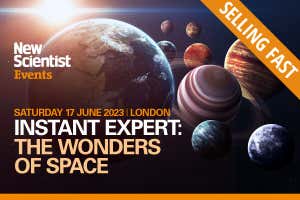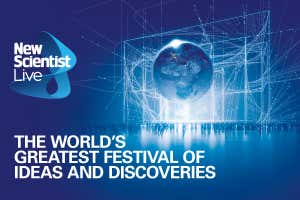New Scientist presents ...
Instant Expert: Wonders of Space
Saturday 17th June, 10am - 5pm | Cavendish Conference Centre, 22 Duchess Mews, London, W1G 9DT
Join us for a day of exploring the mysteries and marvels of the universe with six leading scientists. You will start where everything began, at the Big Bang. Throughout the day, you will hear about the formation of galaxies, the latest research into our nearest star, the Sun, the mysterious physics of black holes, the quest to find life on Mars and the discovery of habitable planets outside our solar system.
The day will be hosted by a New Scientist journalist and there will be plenty of time to ask your questions to our galaxy of space experts.
Tickets for our popular Instant Expert one-day masterclasses are strictly limited and usual sell out quickly, so book now to avoid disapointment.
Topics covered will include:
- Big Bang
- Black Holes
- Formation of Galaxies
- Mars exploration
- Exoplanets
- The Sun
Talks and speakers:
The Big Bang and the Atomic Universe
Katherine Blundell, Professor of Astrophysics, University of Oxford
The Universe began 13.8 billion years ago with the Big Bang and has been expanding ever since. In this talk, Katherine Blundell will explain the recent revolutions in our understanding of the 'Early Universe', which refers to the first few seconds after the Big Bang. She will explain:
+ How these crucial moments determinded our universe today+ What is meant by 'the horizon problem' and 'the flatness problem'+ How we can investigate events that happened so long ago
Black Holes: the most fascinating objects in the universe
Christopher Reynolds, Professor of Astrophysics, University of Cambridge
Black holes are some of the strangest and most fascinating objects in the Universe. A place in space where gravity pulls so much that even light cannot get out sounds like something out of science fiction. But how do black holes form, how many are in our galaxy and beyond, and do new and future technologies such as gravitational wave detectors and next-generation X-ray telescopes change how we observe them?
Galaxies: building blocks of the universe
Claudia Maraston, Professor of Astrophysics, University of Portsmouth
Galaxies are vast collections of stars, gas, and dust, held together by gravity. They come in a variety of shapes and sizes and are scattered throughout the universe. They are the building blocks that chart the history of our universe, but how they form and evolve remains a mysterious process. Join Claudia Maraston as she reveals how her research modelling the galaxies of our universe is expanding our knowledge of cosmology.
Looking for life on Mars
Andrew Coates, Deputy Director (solar system), Mullard Space Science Laboratory, University College London
Are we alone in the Universe? With missions to Mars, and outer planet moons, we hope to find out. We live in an exciting time for Mars exploration. In this talk, Andrew Coates will discuss why Mars is a key target for space exploration, look at some of the early results from the 2021 missions for context, and outline our hopes for PanCam and the Rosalind Franklin rover.
The Sun: Our nearest star
Sarah Matthews, Professor of Solar Physics, University College London
What has our nearest star taught us about all the other stars in the universe? Data from missions such as Japan's Hinode and ESA's Solar Orbiter has revealed much about its magnetic field, solar flares and its corona. Join Sarah Matthews, solar physicist at University College London as she shares her insights on the Sun’s activity, structure and impact on Earth, based on her work on these probes.
Exoplanets: Life beyond the solar system?
Chris Impey, Astronomer, University of Arizona
Since the first exoplanet, or planet beyond our solar system, was discovered in 1995, over 4,000 more have been pinpointed, including hundreds of Earth-like planets, many of them habitable, detected by the Kepler satellite. Join Chris Impey for a state-of-the-art account of what's behind this accelerating progress, what's next, and what it might mean for humanity's future.
Who should attend?
Anyone interested in the mysteries and marvels of space, whatever your age or background. Whether you're a scientist, a student or simply a fascinated human being, Instant Expert: Wonders of Space offers the chance to learn directly from the experts at our one-day masterclass.
Benefits of attending:
- Become an expert in one day
- Informal set-up, meet like minded people
- Open your mind, be inspired
- Unique chance to ask your burning questions to our experts
What's included in your ticket:
- In-depth and engaging talks from six leading scientists
- Ask-an-expert Wonders of Space Question Time session
- Your chance to meet our six speakers and New Scientist host
- Buffet lunch, plus morning and afternoon refreshments
- Exclusive Instant Expert certificate
- Exclusive on-the-day New Scientist subscription deal, book and merchandise offers
Booking information:
The event will be held at the Cavendish Conference Centre, 22 Duchess Mews, London W1G 9DT.
Doors will open at 9:15am, with talks commencing at 10am sharp. The event will finish at 5pm.
We require the name of each person attending - please ensure this is provided at the time of booking. If you need to change the name of an attendee, please notify us as soon as possible: live@newscientist.com
Eventbrite will email you your ticket(s) immediately after purchase. Please remember to bring your ticket(s) with you as you'll need it to gain entry. We can scan tickets from a print out, or off the screen of a phone / tablet / smartwatch.
The ticket price includes a buffet lunch, as well as morning and afternoon refreshments.
The schedule / exact running order for the day will be confirmed closer to the event, and will be emailed to all ticket holders.
Should you require details about disabled access, please contact us at: live@newscientist.com
Tickets are non-transferable to any other New Scientist event.
All tickets are non-refundable.
New Scientist reserves the right to alter the event and its line-up, or cancel the event. In the unlikely event of cancellation, all tickets will be fully refunded. New Scientist Ltd will not be liable for any additional expenses incurred by ticket holders in relation to the event.
Tickets are subject to availability and are only available in advance through Eventbrite.
A limited number of discounted early bird tickets priced at £129 have been made available, saving £20 on the full ticket price of £149. Tickets can be purchased by following the orange "Book Tickets" button at the top of this page, if still available.

